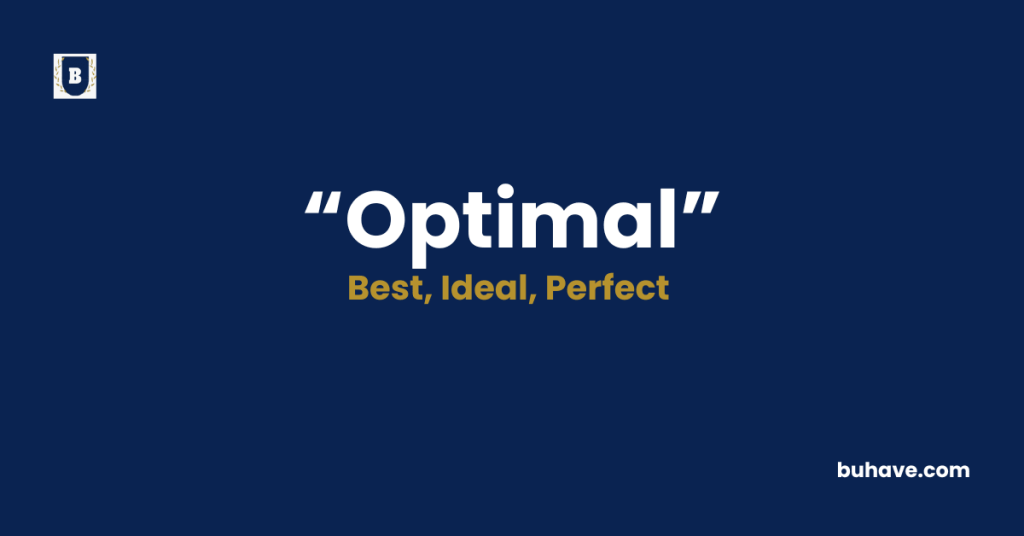The word ‘Optimal’ (Adjective) describes something that is the best or most favorable under a specific set of conditions. In this guide, you’ll learn the full definition, synonyms, antonyms, etymology, and real-life examples of how to use ‘Optimal’ correctly in sentences.
Optimal Explained in Depth
A complete and detailed guide to the word Optimal including meaning, definition, examples, etymology, synonyms, and antonyms.
Meanings of Optimal
The word optimal refers to the most desirable or effective condition, degree, or amount for a particular situation. It’s used when something is not just good, but the best choice given the available options. This term implies that a decision or result has been fine-tuned to achieve the best balance of efficiency, performance, or outcome.
Whether in science, business, health, or everyday life, “optimal” is applied to highlight the highest level of effectiveness or suitability in a particular context.
For instance, if you’re adjusting the temperature for baking bread, the optimal heat would be the one at which the bread rises perfectly and develops the right crust and texture. Similarly, in a business setting, an optimal strategy would be the one that delivers maximum results with the least amount of resources. The term also appears in health and wellness contexts—like “optimal nutrition” or “optimal sleep” to indicate the best possible conditions for health and performance. In short, “optimal” is about finding and using the best approach, amount, or method to achieve the most beneficial result possible.
Definition
Optimal is defined as the most favorable, desirable, or effective condition or outcome under specific constraints or circumstances. It denotes the best possible solution or choice in a particular scenario, usually determined through careful evaluation, testing, or analysis.
The term is widely used in areas such as mathematics, engineering, medicine, economics, and technology to indicate that something is functioning at its highest potential. For example, in computing, an optimal algorithm is one that performs a task in the shortest possible time using the least amount of memory or resources. In health, achieving optimal hydration means having just the right amount of water in the body to support all vital functions.
What distinguishes “optimal” from words like “great” or “excellent” is that it is context-sensitive it’s the best in a specific situation, not necessarily the best universally. The goal of optimal conditions is to reach a state where performance, efficiency, or well-being is maximized with minimal downsides.
Etymology
The etymology of the word “optimal” has roots in classical Latin and follows a logical linguistic evolution into modern English:
- Root: “optimus” – In Latin, “optimus” means “best” or “very good.” It’s a superlative form of “bonus” (good), used to describe something of the highest quality or excellence.
- Modern derivation: “optimalis” – In Late Latin, this evolved into “optimalis,” which means “related to the best” or “pertaining to the best conditions.”
The English word “optimal” began appearing in the early 19th century, particularly in scientific and academic writing. It was adopted to describe the most advantageous conditions in a given system, often in mathematical or theoretical models. Over time, the use of “optimal” spread to broader contexts, including everyday decision-making, health, and business strategies.
It’s closely related to other words with similar Latin roots, such as “optimum” (used as both a noun and adjective), and “optimize” (a verb meaning to make the best or most effective use of a resource or situation). These all come from the same linguistic family and share the fundamental idea of maximizing benefit or performance.
Example Sentences
- The optimal time to plant tomatoes is after the last frost in spring.
- She adjusted the settings for optimal performance on her laptop.
- A balanced diet and regular exercise are essential for optimal health.
- The design was refined for optimal energy efficiency.
- He always seeks the optimal route to avoid traffic during his commute.
Optimal Synonyms
- Best
- Ideal
- Most efficient
- Perfect
- Prime
- Maximum
- Finest
- Most suitable
- Most favorable
- Tailored
Optimal Antonyms
- Poor
- Ineffective
- Inadequate
- Suboptimal
- Inferior
- Unsuitable
- Deficient
- Flawed
- Imperfect
- Unfavorable
FAQs about Optimal
Here are some frequently asked questions (FAQs) about the word “Optimal”
1. What does “optimal” mean in simple terms?
It means the best possible or most effective choice in a particular situation or under specific conditions.
2. Is “optimal” the same as “perfect”?
No. “Perfect” suggests flawlessness in every way, while “optimal” means the best choice in a given situation—even if it’s not absolutely perfect.
3. Can you use “optimal” in everyday conversation?
Yes. While it’s a bit more formal, it’s commonly used in everyday language to describe ideal conditions or choices.
4. What is the noun form of “optimal”?
The noun form is “optimum,” which refers to the best or most favorable condition or result.
5. Is “optimal” always a positive word?
Yes. It always refers to the most desirable or beneficial outcome in a given context.
6. Can something be “too optimal”?
Not really. “Optimal” already implies the best possible balance. However, overly optimizing can sometimes lead to diminishing returns or unintended consequences.
7. How is “optimal” used in health and fitness?
In health, “optimal” refers to the best conditions for physical or mental well-being, such as optimal sleep, diet, or exercise routines.
8. What’s the difference between “optimal” and “efficient”?
“Efficient” means using resources wisely, while “optimal” means achieving the best outcome, which may or may not be the most efficient method.
Explore more O words
Positive words that start with O
Negative words that start with O
Adjectives words that start with O
Nouns that start with O
Verbs that start with O

















